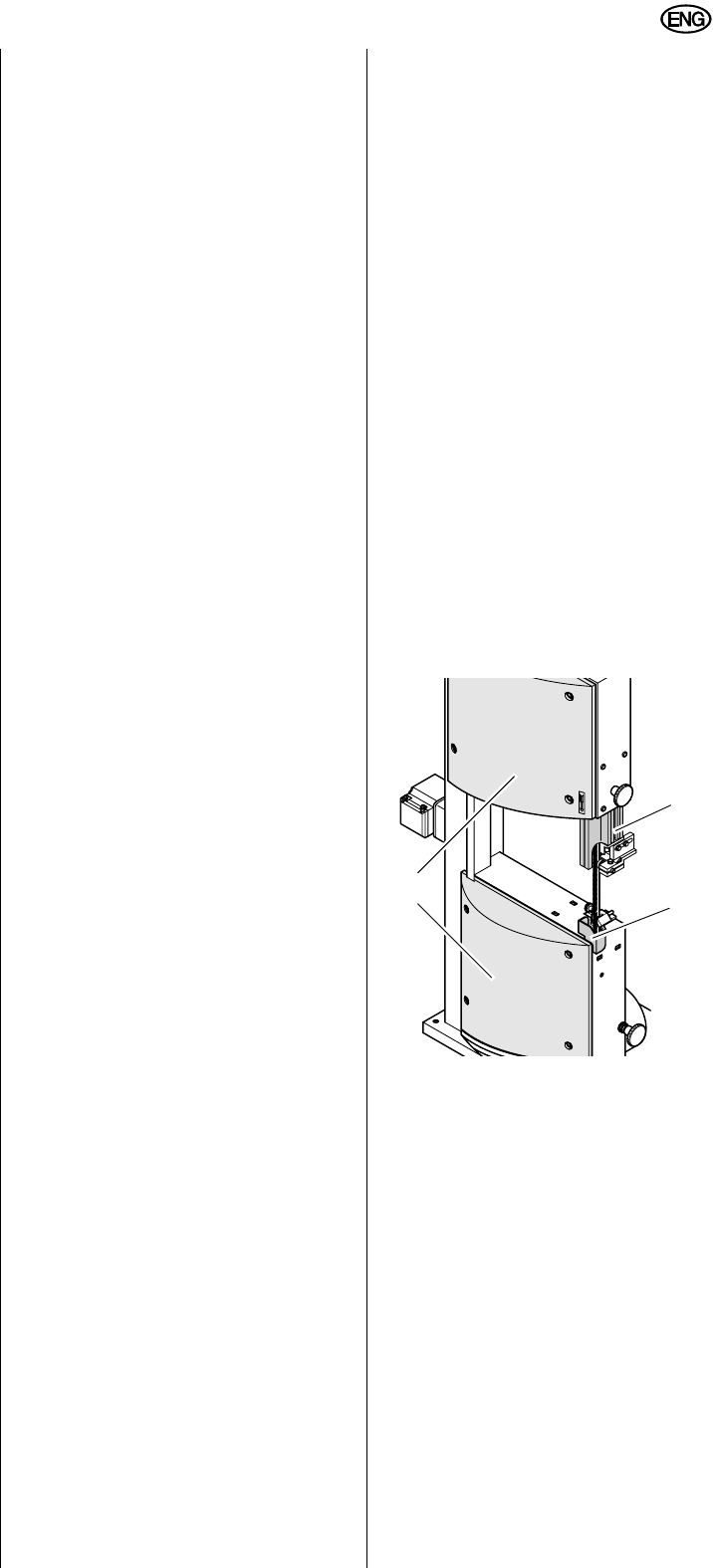
17
ENGLISH
Prevent body contact with earthed
objects such as radiators, pipes,
cooking stoves, refrigerators when
operating this tool.
• Do not use the power cable for any
purpose it is not intended for.
A
Risk of injury by moving parts!
• Do not operate the tool without
installed guards.
• Always keep sufficient distance to
the band saw blade. Use suitable
feeding aids, if necessary. Keep suf-
ficient distance to driven compo-
nents when operating this tool.
• Wait for the band saw blade to come
to a complete stop before removing
cutoffs, scrap, etc. from the work
area.
• Cut only stock of dimensions that
allow for safe and secure holding
while cutting.
• Do not attempt to stop the band saw
blade by pushing the workpiece
against its side.
• Ensure tool is disconnected from
power supply before servicing.
• Ensure that when switching on (e.g.
after servicing) no tools or loose
parts are left on or in the tool.
• Unplug if the tool is not used.
A
Cutting hazard, even with the
cutting tool at standstill!
• Wear gloves when changing cutting
tools.
• Store band saw blades in such man-
ner that nobody will get hurt.
A
Risk of kickback (workpiece is
caught by the band saw blade and
thrown against the operator)!
• Do not jam workpieces.
• Cut thin or thin-walled workpieces
only with fine-toothed band saw
blades. Always use sharp band saw
blades.
• If in doubt, check workpiece for
inclusion of foreign matter (e.g. nails
or screws).
• Cut only stock of dimensions that
allow for safe and secure holding
while cutting.
• Never cut several workpieces at the
same time – and also no bundles
containing several individual pieces.
Risk of personal injury if individual
pieces are caught by the band saw
blade uncontrolled.
• When cutting round stock, use a
suitable jig to prevent the workpiece
from turning.
c
Drawing-in/trapping hazard!
• Ensure that no parts of the body or
clothing can be caught and drawn in
by rotating components (no neck-
ties, no gloves, no loose-fitting
clothes; contain long hair with hair-
net).
• Never saw workpieces containing
the following materials:
− ropes
− strings
− cords
− cables
− wires.
A
Hazard generated by insuffi-
cient personal protection gear!
• Wear hearing protection.
• Wear safety glasses.
• Wear dust mask.
• Wear suitable work clothes.
• When working outdoors wearing of
non-slip shoes is recommended.
A
Risk of injury by inhaled wood
dust!
• Dust of certain timber species (e.g.
oak, beech, ash) can cause cancer
when inhaled: work only with a suit-
able dust collector connected to the
saw. The dust collector must comply
with the data stated in the technical
specifications.
• See to it that only as little as possi-
ble wood dust will get into the envi-
ronment:
− Remove wood dust deposit in the
work area (do not blow away!);
− fix any leakages on the dust col-
lector;
− ensure good ventilation.
A
Hazard generated by modifica-
tion of the machine, or use of parts
not tested and approved by the equip-
ment manufacturer!
• Assemble tool in strict accordance
with these instructions.
• Use only parts approved by the
equipment manufacturer. This
applies especially for:
− band saw blades (see “Technical
specifications” for stock nos.);
− safety devices (see “Technical
specifications” for stock nos.).
• Do not change any parts.
A
Hazard generated by tool
defects!
• Keep tool and accessories in good
repair. Observe the maintenance
instructions.
• Before any use check tool for possi-
ble damage: before operating the
tool all safety devices, protective
guards or slightly damaged parts
need to be checked for proper func-
tion as specified. Check to see that
all moving parts work properly and
do not jam. All parts must be cor-
rectly installed and meet all condi-
tions necessary for the proper oper-
ation of the tool.
• Damaged protection devices or
parts must be repaired or replaced
by a qualified specialist. Have dam-
aged switches replaced by a service
centre. Do not operate tool if the
switch can not be turned ON or
OFF.
• Keep handles free of oil and grease.
3.3 Safety devices
Upper blade guard
The upper blade guard (20) protects
against unintentional contact with the
saw blade and from chips flying about.
In order for the upper blade guard to pro-
vide adequate protection against contact
with the band saw blade, it must always
be set as close as possible against the
workpiece (max. distance 3 mm).
Lower blade guard
The lower blade guard (21) protects
against inadvertent contact with the
band saw blade. When closing the lower
housing door, the lower blade guard
swings over the band saw blade.
The lower blade guard must always be
installed during operation.
Housing doors
The housing doors (22) protect against
contact with the rotating parts inside the
machine.
To lock or unlock the housing doors, turn
the locks a quarter turn with a suitable
slotted bit screwdriver.
The lower housing door is equipped with
a door catch (23). The door catch pre-
vents the closing of the lower housing
door without the chip case (24) being in
place.
20
21
22


















